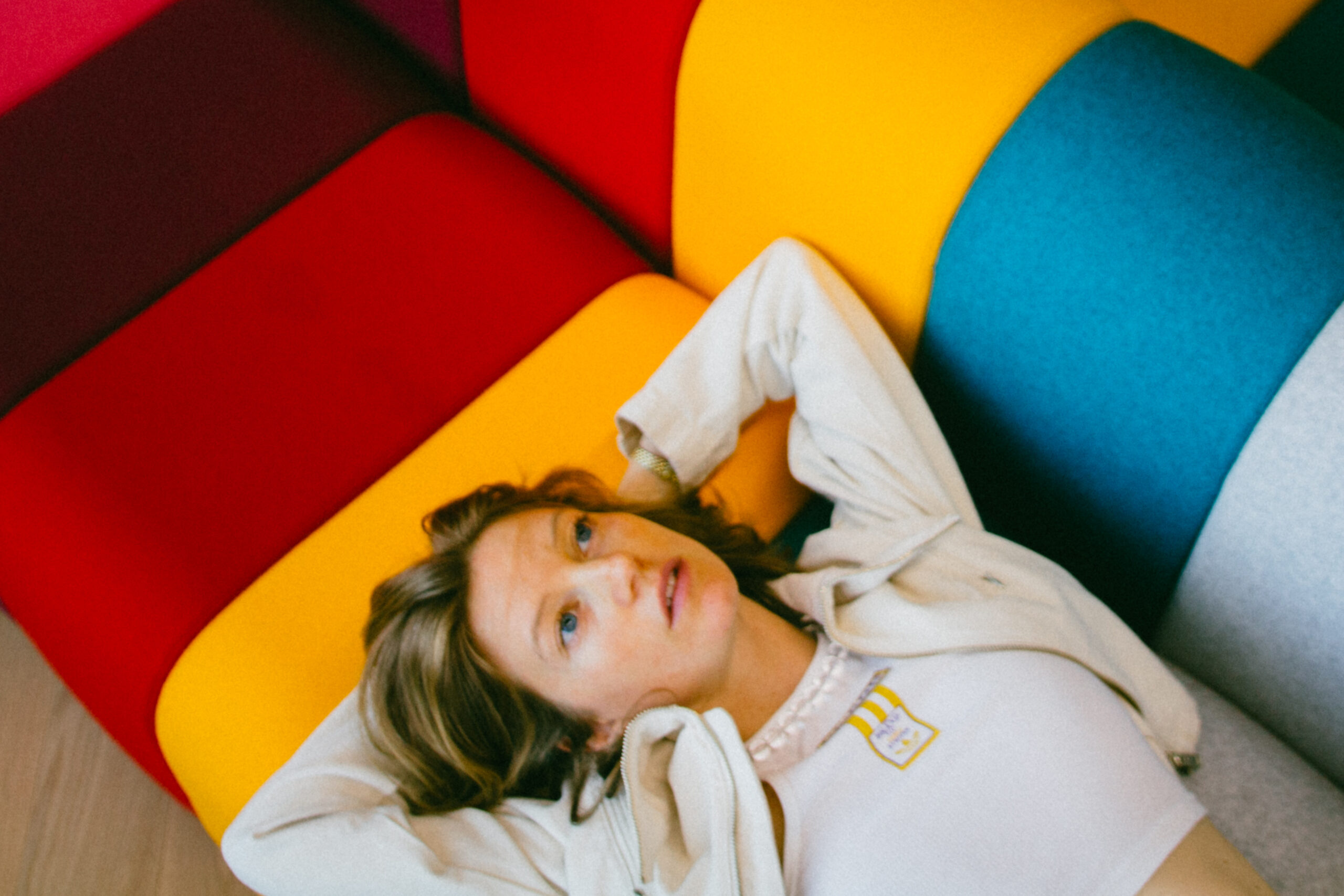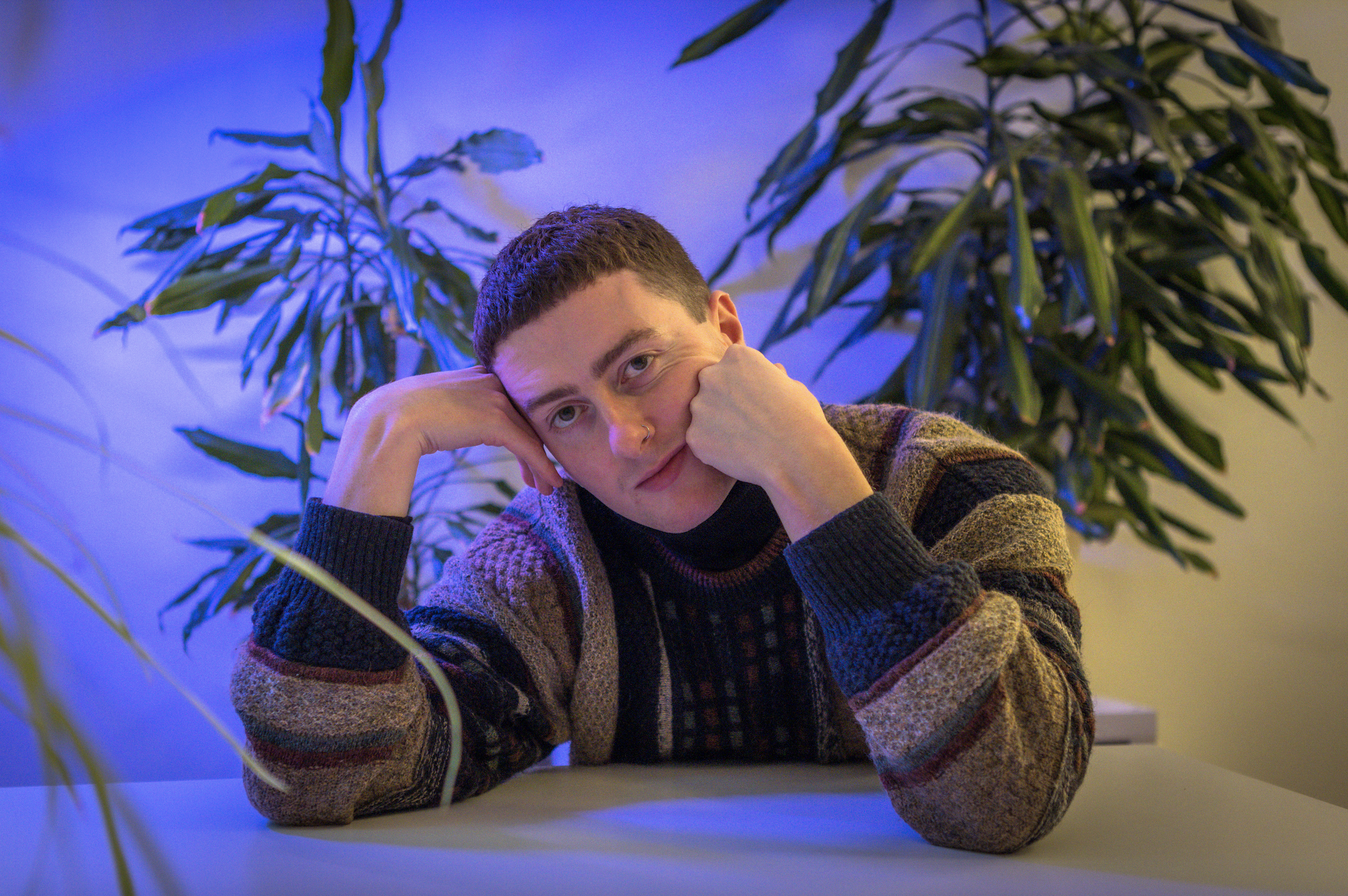Foto-© Hella Wittenberg
Joesefs Pressereise steht Ende November nicht unbedingt unter den besten Vorzeichen: Erst hatte er seinen Reisepass vergessen, dann empfängt ihn Berlin mit Eiseskälte, Wind und Nieselregen. Trotzdem wirkt Joesef ziemlich gut gelaunt, als wir ihn in Kreuzberg zum Interview treffen. Berlin gefällt ihm, und wäre er nicht gerade erst nach London gezogen, könnte er sich gut vorstellen, hier zu leben, erzählt er. Denn er mag Menschen, die wissen, wie man feiert, und die gibt es hier natürlich zu Genüge.
Aber Joesef weiß nicht nur, wie man feiert – die Pubszene und das Nachtleben seiner Heimatstadt Glasgow stecken tief in seiner DNA – sondern auch, wie man Songs schreibt, die einem treffsicher das Herz brechen. Mit Singles wie It’s Been A Little Heavy Lately und East End Coast hat sich der 27-Jährige bereits in die Reihen der melancholischen “sad boy bangers” hochgespielt – ein Label, das er selbst kritisch betrachtet. Am 13. Januar erscheint nun endlich sein Debütalbum Permanent Damage, das nach eigener Aussage von den bleibenden Schäden handelt, die das Ende einer großen Liebe bei uns hinterlassen kann.
Wir haben mit Joesef über das Klischee des depressiven Künstlers gesprochen, der den Schmerz braucht, um kreativ zu sein. Es ist ein sehr persönliches Gespräch geworden, in dem Joesef erzählt, was ihm seine Heimatstadt Glasgow heute noch bedeutet, welche Künstler*innen ihn inspirieren und wie Frank Oceans berühmter Tumblr-Post von 2012, in dem er von seiner Liebe zu einem anderen Mann schrieb, ihm selbst half, sich mit seiner eigenen Queerness wohlzufühlen.
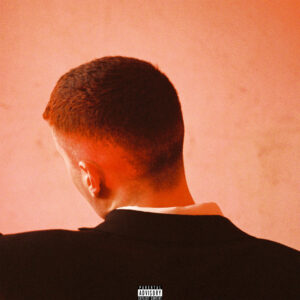 Your debut album Permanent Damage is about to come out. How do you feel about the release?
Your debut album Permanent Damage is about to come out. How do you feel about the release?
Very excited! I’m so ready for it to come out. It was a lot of fucking work, not just the music, but the whole process, creating the aesthetic surrounding it. I’m a very visual person, I understand things a lot through color and images. It was fun to create a visual language that can help people to understand how I see the music. It nearly killed me, but now I’m so buzzed to get it out and have people hear it.
You started making music in your bedroom in Glasgow. Now you recorded your album in London. How did that impact your way of working on it?
In the studio, it was just me and Barney Lister, and I learned so much through him. We shared a lot of tears, mostly of laughter, because he’s a very funny Yorkshire man. It was intense! We had such a good relationship where nothing was off the table. I could come around and not say anything and it wouldn’t be awkward. Or we’d be speaking about what was on our minds for like three hours, and start making music after that.
Your music is deeply personal, and you’ve mentioned that you haven’t always been in a good place while you were working on the album. Do you feel like you’re publishing your diary in a way?
It always kind of feels that way. Sometimes when you’re writing it can feel like no one is ever going to read it, because a lot of my music is written in solitude. I’ve always been quite bad at communicating my feelings and didn’t really have an outlet for it before I started to write music, so I basically began to exercise that part of myself that I always found difficult to translate. Otherwise I would just always go out to party and pass out with my mates and worry about the effects later. I feel like music gave me structure and lets me process the bad things.

Do you think you need melancholia or heartbreak for your creativity?
I definitely think you need to suffer a bit for your art. I guess being happy is quite a mundane feeling. There is this Florence + The Machine song, No Choir, where she sings about how no choirs sing about being happy. Some of the best art erupted from the most tumultuous periods, too; there were so many wars in which amazing paintings were made. When I feel like shit I write a song, so yeah – but I also kind of hope not, because I don’t want to be sad forever… (laughs)
There’s this cliché of the depressed artist who takes all their inspiration from being in that bad place. I feel like it’s important to differentiate between sadness, heartbreak even – and actual depression. What’s your opinion on this? Isn’t the whole concept romanticizing mental illness?
I certainly think that. When I was starting to make music there was this whole “sadboi” thing, and I think it really trivializes a lot of the emotional depths that people experience. There’s this glamorized vision of the tortured artist, and thinking of Van Gogh and all that, it really doesn’t end well for a lot of people. It comes to a point where it’s not just about base-level sadness, but mental health. I myself have walked through some stuff, but making this album has given me a lot of clarity and helped me a lot, actually. It gave me some perspective.
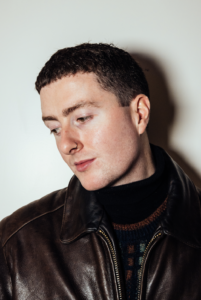 So making music is a bit like therapy for you, too?
So making music is a bit like therapy for you, too?
It sounds cliché, but it really is. Sometimes you write and you don’t really know what you’re talking about. Then you get to the end of it and you’re like, fuck, I must have been feeling like that. It’s always nice to get something good, something tangible – like a song – out of something negative. I think I’m quite lucky, because not everybody gets to do something like that.
What would be that thing for you if it wasn’t music?
I don’t know. I’ve always loved art, maybe I would be an artist? Although, considering my background, I would probably be a bartender or something like that. I’d be a shit bartender, though – when I worked in a bar I was just off my face 24/7. Before I found music I genuinely felt like this was going to be me forever, and I was fine with that. People make a good living in a bar, and it’s sociable. I met some of my best mates working in a bar. It was fun.
Do you miss that part of your life sometimes?
There’s a simplicity to it that I don’t have anymore. But I get a lot more satisfaction making music. I had fun working in a bar, but there comes a point where you’re like: Right, I need to get my fucking shit together. I had no ambitions or structure in my life. I definitely feel very lucky now that I get to do something that I genuinely love and care about.

How did Glasgow and the local music scene inspire and shape who you are, as an artist and as a person?
Everyone in Glasgow is so passionate. There is a very strong sense of community, which I’ve never really felt anywhere else. They’ve been 100% behind me since I started making music, which is the best thing ever. It’s nice to feel so accepted, because growing up in Glasgow has also been difficult at times. It’s a very hyper-masculine place; if you were shit at football, you’d have a weird time there.
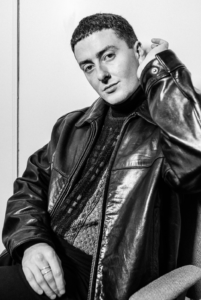 Is’t that strange: feeling so at home at a place and feeling like you cannot really be yourself there at the same time?
Is’t that strange: feeling so at home at a place and feeling like you cannot really be yourself there at the same time?
Yeah, it’s a strange juxtaposition. It took me a long time to feel comfortable in myself and to kind of break with how I felt I should be. It’s a lot of unpacking, but I’ve only gotten more comfortable the older that I’ve gotten. I love Glasgow, and spending time apart from it is good to get some perspective on how much it means to me and how grateful I am to be from a city like that. Glasgow has been instrumental in the success that I’ve had, basically, to begin with. I can only thank the homies for that!
You’ve mentioned in an interview that Frank Ocean’s Blonde is one of your favorite albums ever. It’s also one of mine, so I’m really curious to hear more about what it means to you.
Frank Ocean’s Blonde is genuinely unbelievable to me. I obviously loved Channel Orange, but when Blonde came out, I was obsessed with it. The sonics of that album are so beautifully meditative, ambient, and so specific, too. It’s mad how he did it; it’s just his voice as the driving force of it. I’ve always admired the directness, but also the ambiguity of his storytelling. His lyrics are so specific that only he would know that he’s talking about, but because he’s being so honest you can relate to it at the same time – does that make sense? I really loved Odd Future, Tyler, The Creator and the whole subculture that they built, but Frank was always my main man. And ever since he wrote that thing on Tumblr about falling in love with a boy I was just like… it opened up my entire world. At that time, hip hop was such a homophobic space still, as was most of the music industry. I left my home for a man I was in love with at that time, so it was very inspiring for me, especially coming from this hyper-masculine place in Glasgow, to know that I could be a version of myself that I always wanted to be. And I kind of learned that through Blonde.
That is so beautiful.
Yeah, honestly man, I would actually die for that album. It’s so good, truly, I love it. Now I’m trying to think of other artists…I think Frank is my main guy, especially because of that aspect. I think if I ever met him I would actually collapse. I would have too much to say, so I would probably just be like: Listen, mate. I love you. I hope you can feel that right now. And then I would run away and cry.
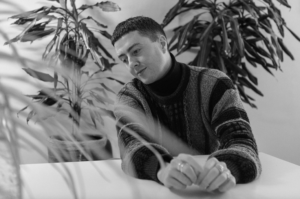
Are there any artists you’d like to work with? I really liked your collaboration with Loyle Carner.
I’d be happy to work with him again in the future. I love his new album, it’s so beautiful! He’s another artist who just knows how to put together a body of work, from start to finish it just feels so cohesive, so straight to the point. And other artists… not so much a musical artist, but I would love to work with Wolfgang Tillmanns, the photographer who shot the cover of Blonde. I’d love to be his subject, or curate some sort of booklet with him. He did a lot of club culture portraits back in the day, and they have so much emotion in them. I’ve always been obsessed with stuff like that.
What does the full-length album as a format mean to you? Some say it’s a dying art form.
Albums are forever – that’s something I’ve always lived by. I recount my life in my favorite albums – that’s when this happened, that’s when that happened. I think the album will never die, the music industry will keep changing but people will always come back to the album. When Kendrick Lamar released To Pimp A Butterfly, people were like: instant classic. But he rejected that, because nothing can be instantly classic: you have to live with an album and let it live with you and let it move and change. I’ve always loved that concept, of albums meaning different things to you as you get older, or as different things happen to you. I feel like that with Blonde; the meaning of it has changed as I got older and experienced different things. I hope that people can take that from my album, and it can be relevant in like ten years time.
Do you feel like you’ve poured everything you have into this album, or are you already thinking about the next one?
Hmm… I’ve got some ideas of how I want the next one to sound, and I’ve written a couple of small things that could be the start of something. But I think I need to do some living first.
Joesef Tour:
16.04.23 Hamburg, Kent Club
18.04.23 Berlin, Lido
19.04.23 München, Strom
23.04.23 Köln, Luxor









